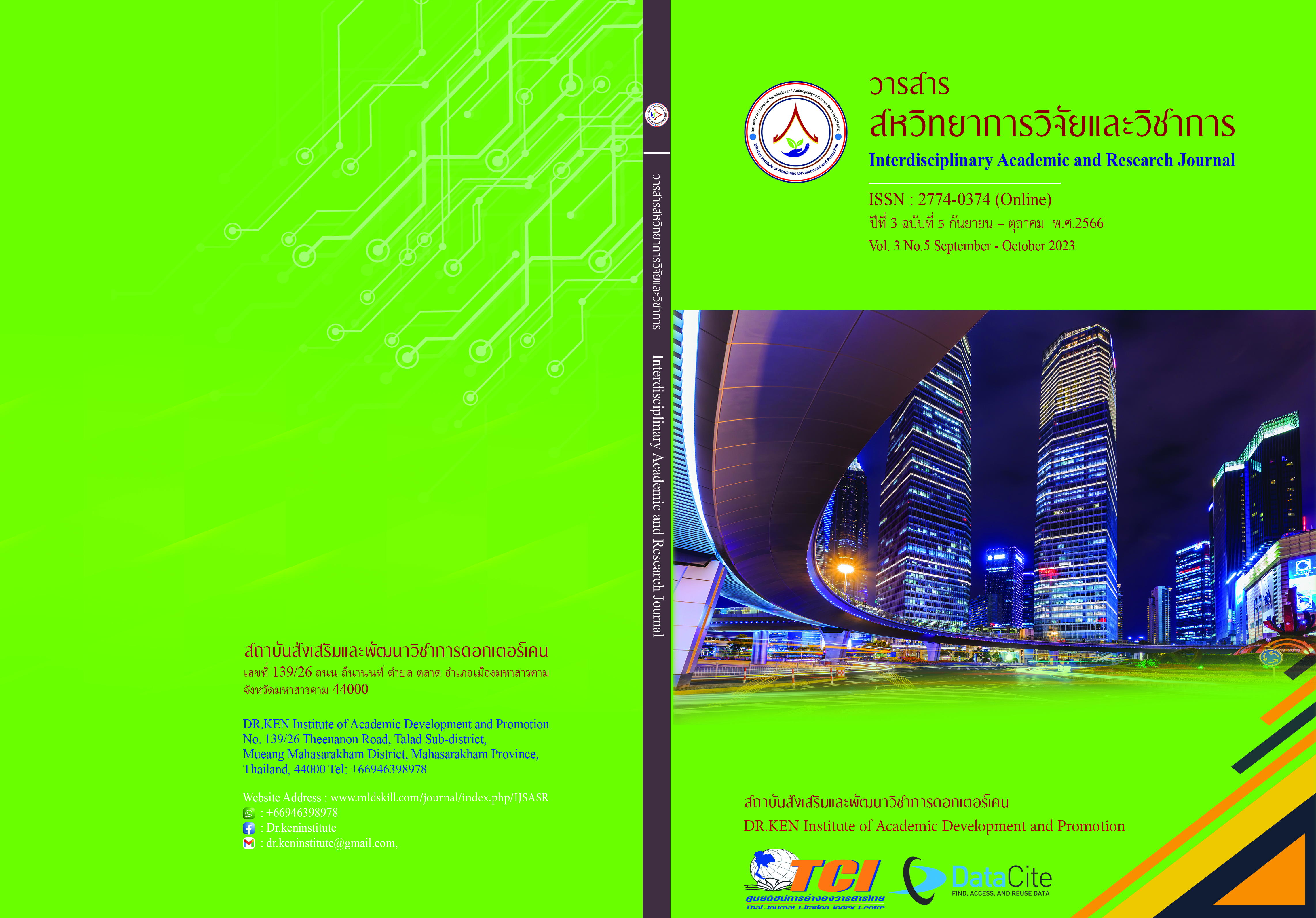The Effects of Learning Experience Provision Using Phenomenon-Based Learning on Creative Problem-Solving Abilities in Young Children
DOI:
https://doi.org/10.14456/iarj.2023.245Keywords:
Phenomenon-Based Learning; , Creative Problem-Solving; , Young ChildrenAbstract
Phenomenon-based learning is an organized experience that allows the learner to apply the knowledge and concepts of each science. Including practical training in learning reasonably interesting phenomena, students will acquire new knowledge and skills and practice applying to that phenomenon. The objective of this research was to study the effects of phenomenon-based learning experience provision on creative problem-solving abilities in young children. The Target group was 20 female and male 4-5-year-old children who were studying in K2, the 2nd semester, academic year of 2022, Phuket Demonstration School. The research instruments included 24 phenomenon-based learning provisions on creative problem-solving abilities in young children, the assessment form of creative problem-solving abilities for young children, and the observational form of creative problem-solving abilities. The data was analyzed by mean, standard deviation, and content analysis. The research finding revealed that young children who received the phenomenon-based learning provision had higher creative problem-solving abilities for young children. The children understood the problems and were able to identify a variety of solving methods.
References
ทิพย์พิมล เกียรติวาทีรัตนะ. (2563). Phenomenon Based Learning: กินดีอยู่ดีและมีความสุข หลักสูตรการเรียนรู้ฉบับฟินแลนด์. Retrieved on January 10, 2023, from: https://www.eef.or.th/phenomenon-based-learning/.
นลินทิพย์ คชพงษ์. (2561). การพัฒนารูปแบบการจัดการเรียนรู้เชิงจิตวิทยาเพื่อเสริมสร้างการแก้ปัญหาอย่างสร้างสรรค์สำหรับนักศึกษาวิชาชีพครู. ปริญญานิพนธ์ปริญญาปรัชญาดุษฎีบัณฑิต มหาวิทยาลัยศรีนครินทรวิโรฒ.
น้ำผึ้ง เลาหบุตร. (2561). การพัฒนาความสามารถในการแก้ปัญหาอย่างสร้างสรรค์และทักษะทางสังคม โดยการจัดประสบการณ์เรียนรู้แบบโครงการสำหรับเด็กปฐมวัย. ปริญญานิพนธ์ปริญญามหาบัณฑิต มหาวิทยาลัยศิลปากร
พงศธร มหาวิจิตร. (2562). การประยุกต์ใช้แนวคิดการเรียนรู้โดยใช้ปรากฏการณ์เป็นฐานร่วมกับการเรียนแบบเชิงรุกในรายวิชาการประถมศึกษา เพื่อเสริมสร้างทักษะการเรียนรู้ในศตวรรษที่ 21. วารสารศึกษาศาสตร์ มหาวิทยาลัยขอนแก่น, 42(2), 73-90.
พัชรา พุ่มพชาติ. (2559). การสร้างเสริมความสามารถในการแก้ปัญหาอย่างสร้างสรรค์สำหรับเด็กปฐมวัย. วารสารศึกษาศาสตร์ มหาวิทยาลัยศิลปากร, 13(2), 56-64.
สำนักวิจัยและพัฒนาการศึกษา สำนักงานเลขาธิการสภาการศึกษา กระทรวงศึกษาธิการ. (2564). ทักษะที่จำเป็นแห่งอนาคต (Future Skill) เพื่อเตรียมการพัฒนาคุณภาพคนไทยทุกช่วงวัย รองรับการเปลี่ยนแปลงอย่างรวดเร็ว (Disruption) ของ โลกศตวรรษที่ 21. Retrieved on January 13, 2023, from: https://opendata.nesdc.go.th/en/dataset/research-0306-2564-11
หทัยภัทร ไกรวรรณ และ ปัทมาวดี เล่ห์มงคล. (2560). การจัดประสบการณ์การเรียนรู้แบบสตีมศึกษาที่มีต่อความสามารถในการแก้ปัญหา อย่างสร้างสรรค์ของเด็กปฐมวัย. วารสารศึกษาศาสตร์ปริทัศน์, 32(1), 1-11.
หทัยภัทร ไกรวรรณ. (2559). การจัดประสบการณ์การเรียนรู้แบบสตีมศึกษาที่มีต่อความสามารถ ในการแก้ปัญหาอย่างสร้างสรรค์ของเด็กปฐมวัย. ปริญญานิพนธ์ปริญญามหาบัณฑิต มหาวิทยาลัยเกษตรศาสตร์.
หัสวนัส เพ็งสันเทียะ. (2563). ผลการจัดการเรียนรู้โดยใช้ปรากฏการณ์เป็นฐานที่มีต่อการคิดอย่างมีวิจารณญาณ และการคิดสร้างสรรค์ ของนักเรียนชั้นมัธยมศึกษาปีที่ 6. ปริญญานิพนธ์ปริญญามหาบัณฑิต มหาวิทยาลัยศรีนครินทรวิโรฒ, กรุงเทพฯ.
อรพรรณ บุตรกตัญญู. (2561). การเรียนรู้โดยใช้ปรากฏการณ์เป็นฐานเพื่อการสร้างมุมมองแบบองค์รวมและการเข้าถึงโลกแห่งความจริงของผู้เรียน. วารสารครุศาสตร์ จุฬาลงกรณ์มหาวิทยาลัย, 46(2), 348-365.
Bruner, J.S. (1966). Toward a Theory of Instruction. Cambridge: Harvard University Press.
Daehler, K. & Folsom, J. (2016). Making Sense of SCIENCE: Phenomena-Based Learning. Retrieved from: https://mss.wested.org/wp-content/uploads/2021/01/mss_pbl.pdf
Islakhiyah, K., Sutopo, S. & Yulianti, L. (2018). Scientific Explanation of Light through Phenomenon-based Learning on Junior High School Student. Advances in Social Science, Education, and Humanities Research. 218(ICoMSE 2017), 173–185.
Silander, P. (2015). Phenomenon Based Learning. Retrieved September 22, 2020 from: http://www.phenomenaleducation.info/phenomenon-based-learning.html
Downloads
Published
How to Cite
Issue
Section
License
Copyright (c) 2023 Warangkhana Tempeim, Chalatip Samahito , Oraphan Butkatunyoo

This work is licensed under a Creative Commons Attribution-NonCommercial-NoDerivatives 4.0 International License.
Copyright on any article in the Interdisciplinary Academic and Research Journal is retained by the author(s) under the under the Creative Commons Attribution-NonCommercial-NoDerivatives 4.0 International License. Permission to use text, content, images, etc. of publication. Any user to read, download, copy, distribute, print, search, or link to the full texts of articles, crawl them for indexing, pass them as data to software, or use them for any other lawful purpose. But do not use it for commercial use or with the intent to benefit any business.
















.png)


